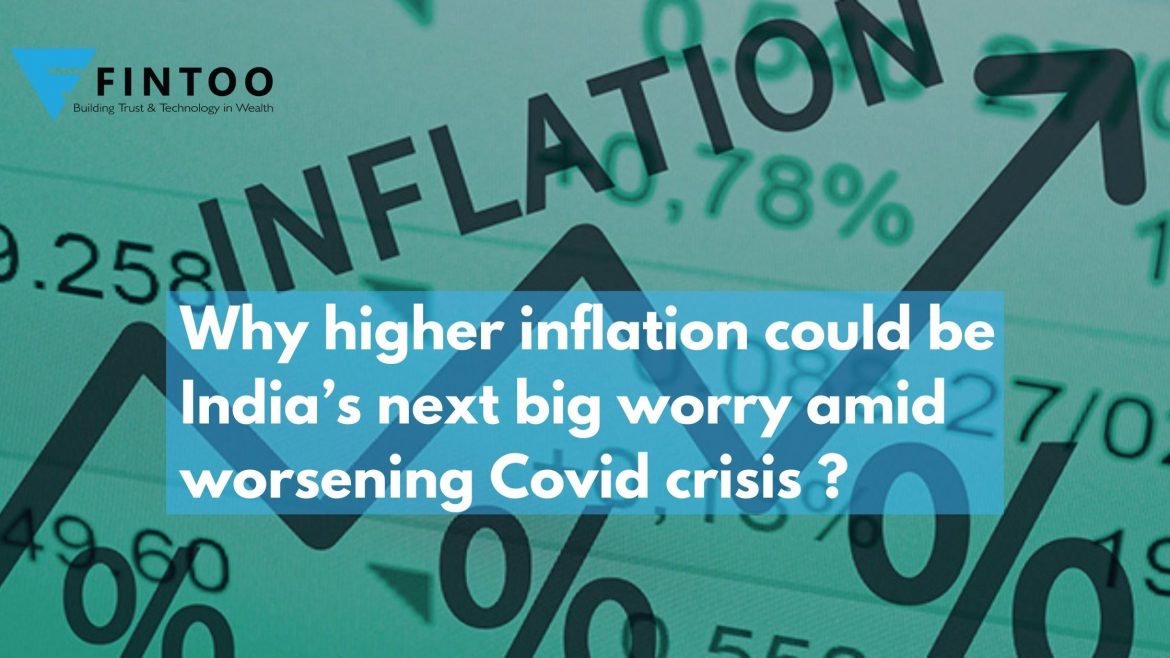

By enhancing fiscal spending, a plethora of governments across the globe have responded to the pandemic, and of course, the central banks have increased the amount of liquidity they usually maintain.
However, some nations, including India, tend to fear that expansionary fiscal and monetary policies could lead to overheating, which is likely to translate into a sharp increase in inflation across several countries as people are likely to step up spending with the economy getting back on track considering the availability of vaccines.
The Consumer Price Index (CPI) inflation which was 4.06 in January 2021 increased to 5.03 in February and further went up to 5.52 in March 2021. An increase in fuel and transportation costs, besides an increase in some elements of the food basket, has led to a rise in CPI inflation. In addition, there is severe upward pressure on inflation in India considering the record Covid-19 surge across the country now while the advanced economies have already started recovering.
Ideally, headline inflation is here to stay as rising commodity prices, local lockdowns, and a weaker rupee will likely bring higher prices in India. Therefore, the analysis here is expected to talk about India’s inflation.
Reasons for Increase In India’s Inflation Rate:
No doubt the world is recovering from the wounds of the pandemic, but the inflation rate in India and economic decisions tend to stir global trends. Additionally, one must know that higher global inflation will likely increase domestic prices through imports.
As the rupee is likely to depreciate against the US dollar, RBI is pretty stressed considering the cost inflation index. Of course, a major miscalculation in the banks’ inflation estimations is reported with the unexpected second COVID-19 wave. As a result, the currency value is further eroding, which is pushing inflation further as RBI is offering support to lower G-Sec yields.
Supply Disruptions:
The big economies, including India, are stressed about inflation rising mainly because of demand-side effects; on the flip side, supply-side factors are likely to make a dent as per experts at inflation calculator India.
City governments are likely to be forced to impose curfews and restrictions on movement considering the Covid cases surge and deaths rise and collapsing health systems. Hence, the local lockdowns and supply disruptions are here to stay.
The preparation is unlikely to be enough for this kind of covid19 surge being seen now, even though the companies are more prepared than they were last year. To quote, supply disruptions tend to cause higher prices without a doubt.
Global Inflation:
The inflation overall is likely to affect the core inflation as higher global inflation is expected to feed the domestic prices through imported goods. In addition, commodity prices, including oil, have also risen and could rise further considering the global economy recovering, which would mean higher imported inflation.
In March, Wholesale Price Index (WPI) based inflation in India rose to an all-time high of 7.39 thanks to the increase in prices of fuel and manufactured products and demand-pull inflation. Under the WPI, manufactured effects weigh at least 65 percent, and it was mainly driven by various factors like steep increases in prices of metals, rubber, chemicals, and textiles.
Globally the prices have witnessed a sharp increase considering the revival in advanced economies, which was rolled out of Covid vaccines, and in the near future, it is expected that WPI-based inflation could touch double digits because of the rise in prices of imported manufactured products. Hence inflation rate in India is likely to increase without a doubt.
Rupee Depreciation:
Expectations about a Federal Reserve rate hike were raised due to the inflation rate of 2.6 percent in March and the interest differential rate in India could trigger a decline in the rupee considering the rising yields.
Due to the Reserve Bank of India (RBI)’s measures to keep the interest rate on government bonds low, the rupee has been depreciating, and the announcement of the G-Sec Acquisition Programme (G-SAP) has most likely led the rupee to fall more than 1.5 percent. The current inflation rate in India is 5.5%.
Sectors Affected By Types Of Inflation:
Aviation and hospitality- Due to inflation, yields in the aviation industry are decreased at an alarming rate. Besides reducing purchasing power, inflation leads to an increase in the prices of goods and services, and the rise in prices of essential crude oil causes an increase in the cost of fuel and will directly lead to a rise in ticket prices. The disposable income reduces due to inflation in India, and people tend to avoid taking vacations to spend money on necessities.
Automation:
One of the vital crucial issues that car manufacturers and buyers face is growing inflation, and of course, the ever-increasing cost of manufacturing equipment directly means that the patrons are likely to pay more.
Inflation Effects On The Indian Economy:
The commodity inflation, lower discounts, operating leverages, and cost-cutting strategies, the Indian economy has undoubtedly faced a setback, and as an escape tool to manage inflation, there can also be a shift in the taxation policies in the economy by the government which make taking out automobile loans all the more challenging.
Metals:
One of the major culprits for inflationary issues across the globe is metals, and the price rise in the metal is a result of high demand cycles and a supply-side problem. As a result, metal prices will soar until economic conditions are back to square one, even though the stimulus plans are put in place by governments across the globe.
Wrap Up:
Inflation tends to point towards a struggling economy as inflation tends to erode the purchasing power significantly as also tends to decrease the value of savings besides depreciating the currency. Above all tends to attract inflation and is challenging for all the players in the industry in some or another way, and to benefit from inflation, consider stock investing. Hence people shouldn’t ignore inflation and its effects.
Must Read: Is It Safe To Invest In Cryptocurrency? Here Is All You Need To Know
A financial planning platform where you can plan all your goals, cash flows, expenses management, etc., which provides you advisory on the go. Unbiased and with uttermost data security, create your Financial Planning without any cost at: http://bit.ly/Robo-Fintoo
Disclaimer: The views shared in blogs are based on personal opinion and do not endorse the company’s views. Investment is a subject matter of solicitation and one should consult a Financial Adviser before making any investment using the app. Making an investment using the app is the sole decision of the investor and the company or any of its communication cannot be held responsible for it.
Related Posts
Stay up-to-date with the latest information.


